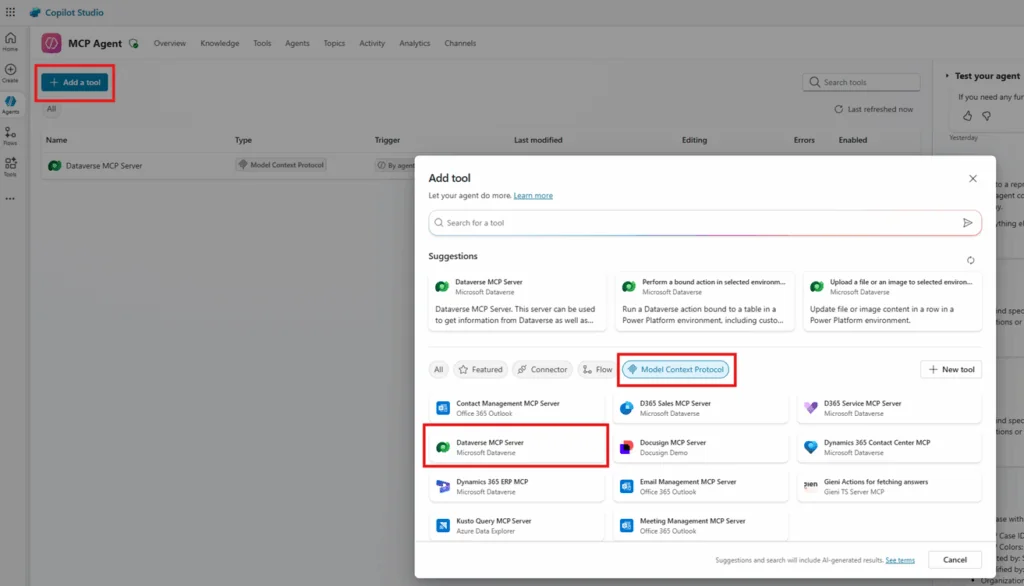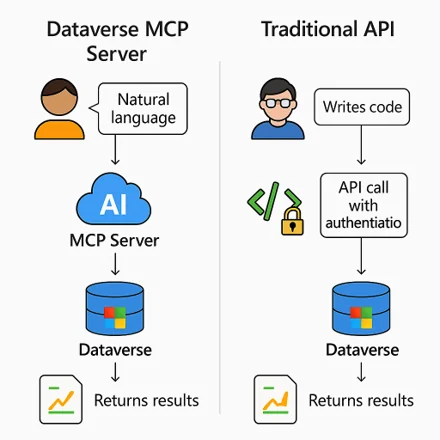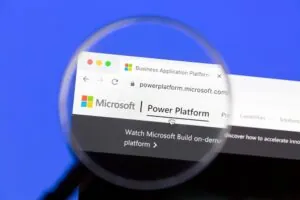Microsoft’s Dataverse MCP (Model Context Protocol) is a game-changer for streamlining workflows and enabling rapid AI app development. MCP empowers teams to accomplish more with fewer steps by reducing the need for extensive setup and configuration. MCP is currently available as a preview feature and is not yet recommended for production use. In this post, we’ll explore how MCP transforms how we interact with Dataverse and why it’s quickly becoming a must-have in the Power Platform toolkit.
What is Dataverse MCP Server?
MCP is an open protocol that connects large language models (LLMs) to enterprise data, providing essential context for advanced AI applications.It transforms structured Dataverse data into interactive, conversational knowledge for LLM agents.
The Dataverse MCP Server enables secure, standardized, and natural language queries to be converted into real-time CRUD operations on Dataverse using platforms like Copilot Studio, Claude, and GitHub Copilot.
Using Dataverse MCP in Copilot Studio
Connecting Dataverse is as simple as adding the MCP Server as a tool to your Copilot agent—no local setup required. Once the connection is established, your agent can access Dataverse data conversationally.

Example Use Case
- A Copilot Studio bot is embedded in the company’s internal support portal
- A support agent types: “Find recent orders for John Smith in the last 30 days.”
- The bot interprets the query using the Dataverse MCP Server and fetches relevant data from multiple Dataverse tables (e.g., contacts, Orders, and Products).
- It displays a clean summary instantly: “John Smith placed 3 orders. Total value: $1,245. Last order: July 28.”
- The agent can then say: “Update the status of the last order to ‘Shipped’”
- The bot uses the MCP server to update Dataverse in real time.
Key Benefits
- No code required:Tasks can be performed without FetchXML queries or navigating Power Apps screens.
- Rapid insights:Improves support response times and delivers real-time customer data.
- Accessibility:Non-technical staff interact with enterprise data securely, benefiting from Microsoft identity services such as RBAC and MFA.
- Business rules-aware:MCP leverages existing Dataverse schemas and rules.
- Standardized access: Provides compliant data sharing across AI platforms, removing the need for custom APIs.
Dataverse MCP vs Dataverse connector
MCP delivers a simpler, natural interaction workflow:
- The classic connector demands manual topic creation, field mapping, query filtering, and Power Fx coding for conversation tracking and logic.
- While functional, traditional connectors require much more developer effort and lack the adaptability of natural language, intelligence for multi-table queries, and ease of reasoning —making workflows more manual and technical.

Limitations and considerations
Performance and Scalability
- Token and Session Limits: Errors like “Request denied,” “Session expired,” or “401 Unauthorized” occur if limits are hit or tokens expire.
- Resource Constraints: High demand or large-scale deployments may face bottlenecks as MCP matures.
Security and Permissions
- Security Model:MCP uses Dataverse security roles, but is currently less robust than REST APIs. Microsoft is actively improving this.
- Network Protection:Always use authentication and TLS encryption.
- Least Privilege:Restrict server/service account access to only necessary operations.
- Auditing:Enable logs and support per-user action tracking.
- Endpoint Hardening:Validate all inputs, disable unused tools, and follow secure coding practices.
Features and Tooling Gaps
- Some advanced actions (table schema changes, granular CRUD) remain in preview.
- Data type limitations: Complex/custom columns (polymorphic lookups, multi-select choices, file/image columns, calculated/rollup columns) are partially or not supported.
- Troubleshooting often requires manual log review.
- MCP is currently in preview and not for production use. Evolving client support may require additional configuration.
- Integration with other clients requires additional configuration or may not be possible. Troubleshooting requires manual intervention and log reviews.
What’s Next
New features like remote Dataverse MCP servers, table-level CRUD actions, and granular admin controls are entering private preview. This will further simplify deployment and improve security.
How AIS Can Help
Adopting MCP can boost productivity and automate business processes, but success requires planning for compatibility, security, and compliance. Contact AIS today for support and information as you explore this technology.






